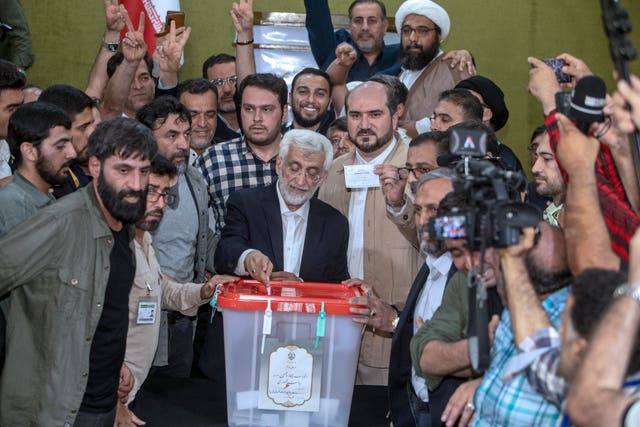Reformist candidate extends lead in Iran’s presidential election
Masoud Pezeshkian’s lead against hard-liner Saeed Jalili widened early on Saturday to more than two million votes.

Reformist candidate Masoud Pezeshkian’s lead against hard-liner Saeed Jalili widened early on Saturday to more than two million votes as counting continued in Iran’s presidential run-off election.
Supporters of Mr Pezeshkian, a heart surgeon and long-time politician, entered the streets of Tehran and other cities before dawn to celebrate as his lead grew over Mr Jalili, a hard-line former nuclear negotiator.
But a possible win for Mr Pezeshkian still sees Iran at a delicate moment with tensions high over the Israel-Hamas war in the Gaza Strip, Iran’s advancing nuclear programme and a looming US election that could put any chance of a detente between Tehran and Washington at risk.
Mohsen Eslami, an election spokesperson, said Mr Pezeshkian had 11.1 million votes, leading Mr Jalili’s nine million. He gave no total turnout figure as counting went on.

Iranian officials have long pointed to turnout as a sign of support for the country’s Shiite theocracy, which has been under strain after years of sanctions crushing Iran’s economy, mass demonstrations and intense crackdowns on all dissent.
Government officials up to Supreme Leader Ayatollah Ali Khamenei predicted a higher participation rate as voting got underway, with state television airing images of modest lines at some polling centres across the country.
Online videos purported to show some polls empty while a survey of several dozen sites in the capital Tehran saw light traffic amid a heavy security presence on the streets.
The vote comes amid heightened regional tensions. In April, Iran launched its first direct attack on Israel over the war in Gaza, while militia groups that Tehran arms in the region — such as the Lebanese Hezbollah and Yemen’s Houthi rebels — are engaged in the fighting and have escalated their attacks.
Iran is also enriching uranium at near weapons-grade levels and maintains a stockpile large enough to build several nuclear weapons, should it choose to do so. And while Khamenei remains the final decision-maker on matters of state, whichever man ends up winning the presidency could bend the country’s foreign policy toward either confrontation or collaboration with the West.
The campaign also repeatedly touched on what would happen if former US president Donald Trump, who unilaterally withdrew America from the Iran nuclear deal in 2018, won the November election.
Iran has held indirect talks with President Joe Biden’s administration, although there has been no clear movement back toward constraining Tehran’s nuclear programme for the lifting of economic sanctions.
More than 61 million Iranians over the age of 18 were eligible to vote, with about 18 million of them between 18 and 30. Voting was to end at 6pm but was extended until midnight to boost participation.
The late president Ebrahim Raisi, who died in a May helicopter crash, was seen as a protege of Ayatollah Khamenei and a potential successor as supreme leader.





